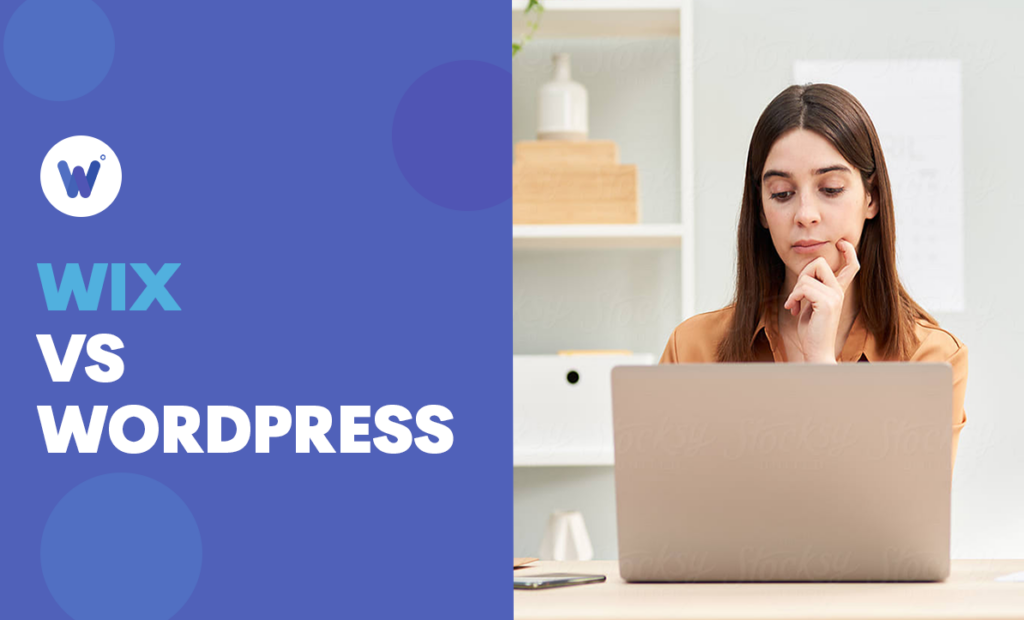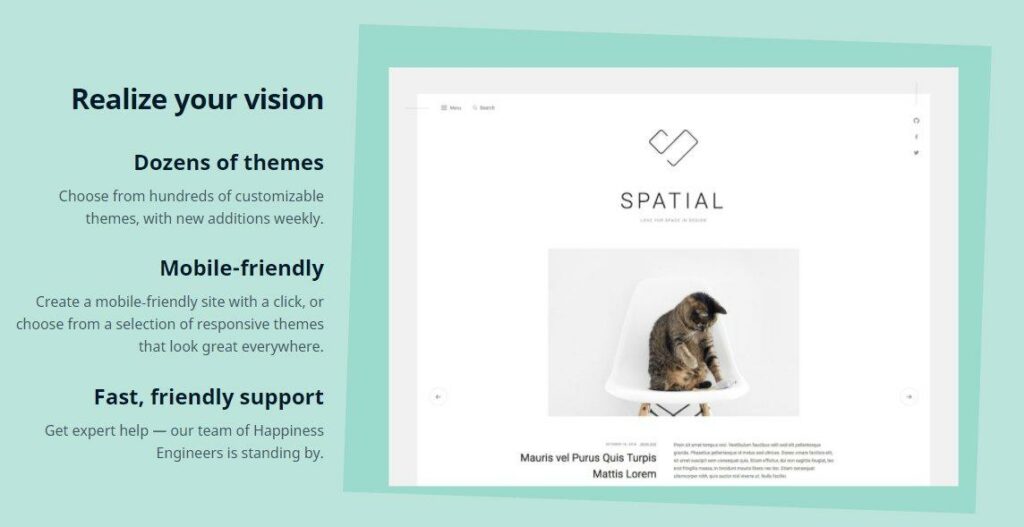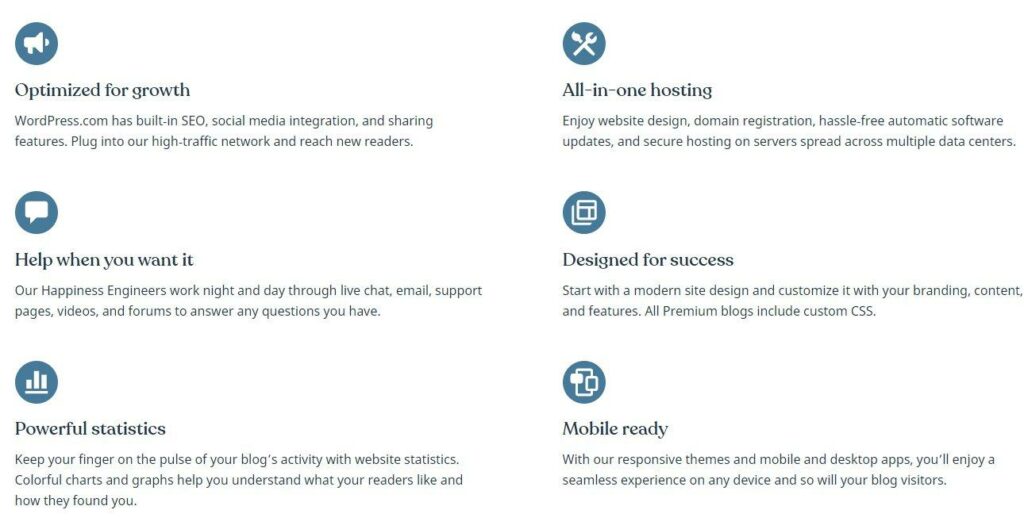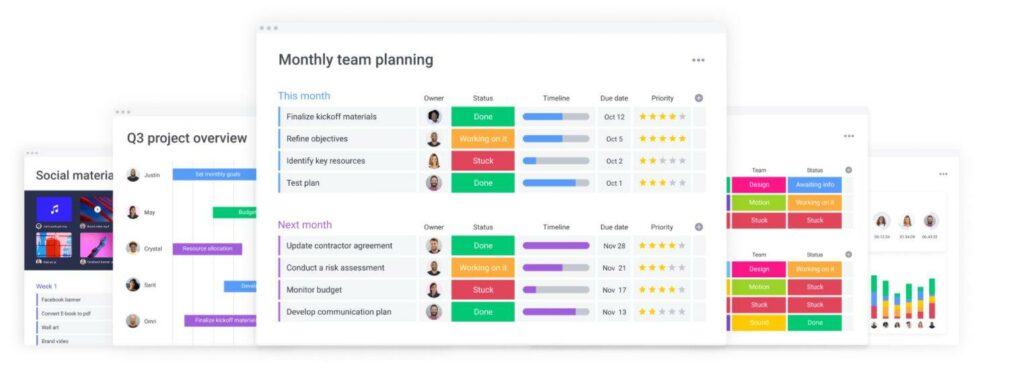
In this day and age, as a business, if you don’t exist online, you might as well not exist at all. Social media pages are great things to have, but even if you plan on doing the bulk of your communication and marketing on there, you need a brilliant web presentation.
There are various website building tools and options available on the market, but some are more complex than others. You’ve probably heard that Wix and WordPress are among the most straightforward website building tools around. But which one is ideal for your needs?
In this article, we’re going to give you a detailed breakdown of the two. We’ll take a look at what each platform offers, their target market, and price differences.
Effortlessly export your Google Docs to WordPress with just 1-click.
Get Started TodayBefore we look at the finer details, let’s quickly examine the two brands in question.
What Does Wix Offer?
Wix is a very basic tool with a free website builder. Unfortunately, Wix features advertisements on both the top and the bottom of your build website.
These ads are removed using any of Wix’s premium plans. Another downside of Wix is that you can’t use your custom domain name on the free plan. In other words, your address will be: “[username].wix.com/[site’s name].”
The free plan also doesn’t feature various add-ons like Favicons, eCommerce, Google Analytics, and so on.
How Much Does Wix Cost?
Wix offers five different plans. Here’s a breakdown of each one. All available plans remove the top and bottom Wix ad from your website. They also let you use a custom domain (free for a year), and get you a free SSL certificate.

What Does WordPress Offer?
WordPress is the world’s most popular easy-to-use website builder. It is open-source, meaning that everyone can use it for free. So, what’s the catch here?
Well, first of all, to get started, you need a web host and a domain name. You are the one who chooses your hosting provider, which can be a bit confusing and tedious, particularly for a beginner.
We suggest that you go with a managed hosting provider, so you don’t have to worry about various hosting technicalities. WP Engine, for instance, costs $29 a month, which is, in itself, more expensive than Wix’s ultimate subscription. If you plan on managing your own web hosting, you can find a provider for a few dollars monthly.
Then, there’s the factor that the free WordPress allows a limited number of free plugins and themes. You’re going to have to pay up for extra features. Still, WordPress offers thousands of free themes, which you can customize to fit your website needs.
How Much Does WordPress Cost?
As the WordPress platform is completely free, we can’t make a real pricing comparison. But here are some things that you should keep in mind when considering the cost of building website on WordPress:

To understand which of these two options to go with, you need to know more than its basic functions and pricing. With this in mind, we’re going to take a look at how each of the two platforms perform regarding the most important website building tasks.
We’re talking about site builders that don’t require coding experience. So, you’ll want your go-to platform to be as simple to use as possible. Some modern tools even offer AI website-building capabilities, helping users create personalized sites faster with minimal effort.
How Wix Handles It
Wix has easy-to-use tools but still remains a powerful platform. The interface is drag-and-drop based; select a site element, drag-and-drop it, and start editing it instantly, using a straightforward WYSIWYG (what you see is what you get) interface. Rearrange things in a straightforward manner, edit everything that you want in a simple way, and enjoy a beginner-friendly environment.
How WordPress Handles It
WordPress has a visual editor that allows you to input and edit written content. There is also a theme customizer tool in an overall WYSIWYG environment. So, no coding necessary here, either. However, in itself, WordPress doesn’t come with a drag-and-drop function.
To truly master WordPress, you need to become familiar with the customizer, navigation menus, visual post editor functions, etc. You can expect a small learning curve with WordPress, but with the assistance of a WordPress AI website builder, this learning curve is significantly reduced as the AI simplifies customization and design processes.

When creating a website, its design and layout are among its most important factors. This directly impacts your website’s user experience.
How Wix Handles It
First of all, Wix features more than 500 templates that can get you started. Every single of these designs are written in HTML5. Plus, Wix makes rearranging the items, customizing the design, and changing the layout straightforward. The available templates are separated into different categories, such as personal, eCommerce, business, hobbies, arts & crafts, etc.
Unfortunately, the template selection is the first step toward creating a website. Once you’ve chosen a template, you can’t change it. This is a significant downside to using Wix.
How WordPress Handles It
WordPress offers thousands upon thousands of themes, some of which are free and some not. Naturally, a paid theme will enjoy better customer support options and will look better and offer more functions.
WordPress has a very powerful collection of themes, that can cover the needs of someone looking to make a practice website, but also the needs of an enterprise-level eCommerce store. Naturally, using a variety of available styling plugins, you can further customize your website’s look.
But most importantly, unlike Wix, WordPress allows the user to create a custom theme from scratch. The principle here is simple enough that you can easily handle it on your own, with a bit of practice.
Think of plugins and apps as third-party extensions and widgets. Some of them increase the performance capabilities of your website, while others give you various necessary functions.
How Wix Handles It
Wix offers around 200 apps you can use on your website. These vary from email marketing tools to galleries, social media buttons, etc. These come in free and/or paid versions. Some require a one-off payment, some are paid monthly, while others are completely free. Wix offers some pretty decent options.

How WordPress Handles It
WordPress offers tens of thousands of free plugins only in its WordPress.org directory. Then there are various other marketplaces that offer other premium plugins. In fact, if you can think of a website feature, you’ll most likely find it in a WordPress plugin directory.
WordPress does it all – if you want to create a contact form, it has got you covered. If you want to use Google Analytics, no worries. Want to sell online courses or create a membership-type of a site? Yes, you can find these kinds of plugins for WordPress.
When it comes to plugins, which are often immensely important, WordPress definitely takes the cake.
Wix isn’t necessarily better than WordPress and vice-versa. Like with most popular tools, each one will find its crowd. The best way to break down this question and give you an answer is to consider the two platforms across three business sizes.
Despite the fact that WordPress is, in itself, free, it usually ends up costing you much more than the most expensive Wix plan. You can leverage the cost and keep it down, but Wix will usually come out as a cheaper option.
For a small business or a startup, cutting expenses is tremendously important. We’d recommend going with Wix here. Consider that you may have to migrate to WordPress at some point, though.
Although medium-sized businesses are also often looking to cut their costs, their requirements are also greater. With all the plugins that are available on WordPress, it’s usually a no-brainer choice for a mid-sized business.

Plus, if you go with Wix here, you may have to migrate to a different platform sooner rather than later. This is a headache that you may want to avoid.
A large business has to be prepared to add all the functions its customers and clients want at any time. There is a clear lack of plugins and apps with Wix. Plus, there’s the customizability factor with WordPress, and a dynamic range of hosting options.
An enterprise-level business is likely to have enough money for covering all WordPress needs (to say the least). Plus, a large company can afford to hire a WordPress developer who can work on WordPress and give you exactly what you’re looking for.
Wix simply isn’t a viable solution for an enterprise-level company.
Let’s start off by saying that Monday.com has nothing to do with website building, aside from the fact that it can serve as a collaboration platform for the employees that are building said website.
However, there are teams who might be considering building a management website of their own, to personalize their collaboration experience. This will cost you much more than going with a simple-to-use, yet diverse tool, such as Monday.com.
Whether you’re tackling marketing, CRM and sales, project management, software development, IT, HR, construction, design, task management, or any other business requirement, Monday.com offers simple collaboration options for most business purposes.

Wix is a fantastic and simple-to-use platform with the drag-and-drop function and around 200 plugin options. If you are building a personal website for your startup/small business, Wix should suffice. This goes especially if you don’t need any extra features and functionalities on your website.
If you are looking for a basic website visual representation that you can put written information on, there is no need to go with WordPress – it’s likely to cost you more and require more attention.
On the other hand, a large business can never thrive using Wix. There is a clear lack of plugin functionalities on this platform; whereas WordPress offers tens of thousands of app and plugin options. Unfortunately, WordPress is a bit less intuitive than Wix and is likely to set you back more and require maintenance.
In the end, we are certain that both of these platforms will find a very different, but perfect user.